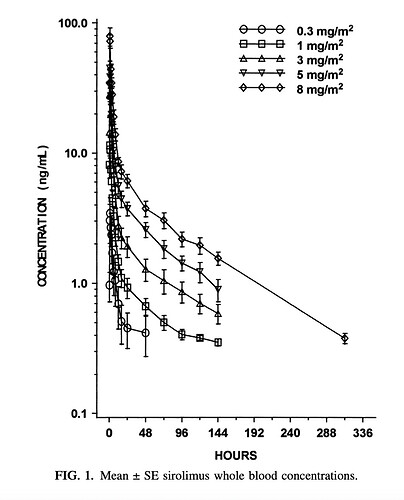Hi, welcome to the forum. Good question. What types of exercise do you do?
I also stopped taking metformin because of the negative impact on muscle regeneration after exercise (and moved on to canagliflozin and then empagliflozin - and empagliflozin at a low dose seems to be working ok).
There is theory and there is reality when it comes to rapamycin and exercise… the theory/science is that MTOR is required for muscle growth and regeneration. And - if you completely inhibited MTOR, All the time, it probably does block muscle growth and benefits of exercise.
But - the research shows that rapamycin doesn’t completely inhibit MTOR - even at high doses. See this paper: Rapamycin inhibits mTORC1, but not completely
But - if you look at the blood levels of rapamycin after taking a dose, and we assume that a person is on a pulsed, weekly or bi-weekly dosing schedule for their rapamycin. Then, in this case the MTOR inhibition seems to take place mostly during the first half of your higher blood levels period, and as the blood level goes down there is less and less MTOR inhibition.

If you’re exercising the entire time (say, daily) - its not a problem - and is actually recommended by many of the doctors (Dr. Peter Attia and others). Exercising during the period of higher MTOR inhibition helps conserve your muscle, and exercising when you are out of there MTOR inhibition period seems to likely be a period of regular / good muscle growth and regeneration, and you gain the regular benefits of exercise.
When you’re taking the rapamycin - I haven’t heard of anyone who has noticed any difference in terms of how you feel while exercising (and on the typical anti-aging protocols for rapamycin use). I’m in much better shape now after two years of rapamycin - and I exercise 3 to 5 times a week, a combo of cardio, weights, indoor rock climbing, mountain biking, kayaking, etc. - and feel great. My muscles are growing stronger, and I can lift more each month. Rapamycin does, however, seem to make it easier to lose fat/ weight and maintain that loss - in effect probably helping give you that well-defined body that many people who exercise appreciate or desire. In fact, in the PEARL study, the key endpoint they are measuring against (because a researcher has seen this as one of the strongest, consistent outcomes in mammal studies) is visceral fat reduction. So, if you want to be as lean as you might have been in your 20s; rapamycin seems to help towards that goal, and even more so if you’re exercising regularly.
There is a well known personal trainer named PD Mangan with a microbiology background who uses rapamycin and touts its benefits. He posts photos with claims about how rapamycin (along with lots of exercise and a more keto-oriented diet) has helped him achieve the fitness he’s gained in the past few years. He’s posted pre-training, pre-rapamycin and then the post training/rapa photos online - click here and you can see the rapamycin isn’t preventing him from getting fit.
Here is some research on the topic:
The role of mTOR signalling in the regulation of skeletal muscle mass in a rodent model of resistance exercise
Resistance exercise initiates mechanistic target of rapamycin (mTOR) translocation and protein complex co-localisation in human skeletal muscle